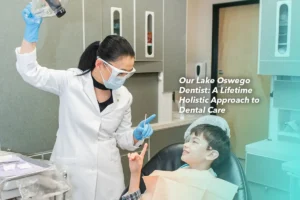Teeth whitening is a popular cosmetic procedure, but our holistic approach differs slightly. It prioritizes natural, non-toxic methods that support overall oral health while brightening your smile.
Unlike treatments that rely on harsh chemicals like hydrogen peroxide, holistic teeth whitening emphasizes gentle, sustainable practices that align with the body’s natural balance and focus on using natural ingredients and techniques to remove stains and enhance tooth brightness without compromising enamel or gum health.
As always, we consider the connection of your oral health and entire body wellness. To ensure we maintain a balance, we avoid the use of synthetic chemicals that may cause sensitivity or long-term damage. With our holistic whitening, the goal of your treatment is to achieve a brighter smile while promoting a healthy oral microbiome (the microorganisms in the mouth) while minimizing the impact potentially harmful substances can have on your body.
Why You Should Consider Holistic Teeth Whitening
Before we cover our treatment options, let’s take a look at what a conventional dentist offers to brighten your teeth and how our treatment differs.
Most dentists will offer you bleaching gels or strips, often contain hydrogen peroxide or carbamide peroxide. Applied directly to the teeth, these treatments work by penetrating into the tooth enamel and dentin, and causing stain molecules to oxidize and become lighter. These gels can be effective, but they may also cause irritation and increased sensitivity.
By contrast, we use plant-based or naturally derived ingredients that are gentler on the teeth and the body. For those that want to an alternative to the common bleaching techniques, our holistic teeth whitening can be a great way to get great results without the typical concerns.
The Dietary Adjustments You Can Make To Have Whiter Teeth
Wait, can you actually make changes to your diet that may help to improve whiteness? Yes, you can. There are certain foods and drinks that naturally support whiter teeth by reducing stains or promoting saliva production, which cleanses the mouth.
Crunchy fruits like apples and crunchy vegetables like celery and carrots can actually help to remove debris on the teeth. These “natural abrasives” can help reduce the amount of buildup or plaque on the teeth.
Then, there are fruits that contain certain types of compounds that can help to break down stains, such as strawberries. Malic acid is contained in most strawberries and can help to improve the overall whiteness of the teeth, especially when mashed up and applied directly to the teeth for a few minutes.
Of course, there are also certain dairy products like cheese and yogurt which contain enzymes, probiotics, and calcium, which can strengthen tooth enamel and increase saliva production.
As you probably already know, avoiding certain foods and drinks can also help significantly. Drinks like coffee, tea, soda, and red wine should be limited along with sugary or highly acidic foods.
Herbal Remedies
Certain herbs, like turmeric and basil, have anti-inflammatory and antimicrobial properties that support oral health and may reduce staining. To use turmeric, mix a small amount of organic turmeric powder with water to form a paste. Brush gently, then rinse well. For basil, chew fresh basil leaves or use dried basil powder as a mild abrasive paste. These remedies help reduce inflammation and fight bacteria while gently whitening. Remember that turmeric can temporarily stain skin or brushes, so rinse thoroughly.
Baking Soda
When used sparingly, baking soda (sodium bicarbonate) is a mild abrasive that can scrub away surface stains without damaging enamel. Mix a small amount of baking soda with water to form a paste. Brush gently with the paste no more than 1–2 times a week, then rinse thoroughly. Baking soda is effective at removing coffee, tea, or wine stains. However, overuse can erode enamel, so limit to occasional use and avoid abrasive scrubbing.
Activated Charcoal
Activated charcoal is a highly absorbent substance that can bind to stains and toxins, making it a popular natural whitening agent. Dip a damp toothbrush into food-grade activated charcoal powder and brush gently for 1–2 minutes. Rinse thoroughly. Activated charcoal removes surface stains and detoxifies the mouth but you should use it sparingly (1–2 times a week) to avoid enamel wear. Ensure the charcoal is food-grade, as other forms may be unsafe.
Apple Cider Vinegar
Apple cider vinegar has natural bleaching properties due to its acetic acid content, which can help remove stains. Simply dilute 1 teaspoon of raw, unfiltered apple cider vinegar in a glass of water and use as a mouth rinse for 30 seconds. Rinse with plain water afterward to protect enamel. This remedy breaks down stains and balances oral pH. Never use it undiluted, as its acidity can erode enamel over time.
Oil Pulling
Oil pulling is an ancient Ayurvedic practice that involves swishing a tablespoon of organic oil (typically coconut or sesame) in your mouth for 10–20 minutes. The oil binds to toxins and bacteria, helping to remove surface stains and promote oral health. Swish 1 tablespoon of cold-pressed coconut oil in your mouth daily, ideally in the morning, to reduces plaque, fight bacteria, and gently lift stains. Spit the oil into a trash can (not the sink, to avoid clogging) and rinse with water. Avoid swallowing the oil, as it contains toxins after swishing.
Benefits of Holistic Teeth Whitening
Holistic teeth whitening offers a safe, natural alternative to conventional methods, prioritizing oral health and sustainability. By incorporating practices like activated charcoal and baking soda along with dietary changes, you can achieve a brighter smile without harsh chemicals. With patience, holistic methods can enhance your smile while supporting your overall well-being. Holistic teeth whitening is gentler on teeth and gums and is less likely to cause sensitivity or irritation. Many ingredients are sustainable and biodegradable, and common household items like baking soda or coconut oil are affordable.
Lifestyle Tips for a Whiter Smile
Drink plenty of water to rinse away food particles and maintain saliva production. Brush twice daily with a natural, fluoride-free toothpaste and floss regularly to prevent plaque buildup. Avoid smoking, as tobacco is a major cause of yellowing and staining.
Consult Dr. Yamaguchi before starting any whitening regimen, especially if you have sensitive teeth, cavities, or gum issues. You can arrange an appointment by visiting our home page or calling us at (503) 603-0700.




